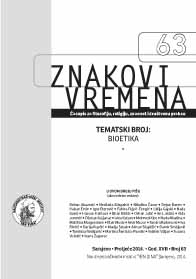Rabinska antropologija i savremene bioetičke i naučno-kritičke debate
Rabbinic anthropology and modern ethical and scientific-critical debates
Author(s): Matthias MorgensternSubject(s): Christian Theology and Religion
Published by: Naučnoistraživački institut »Ibn Sina«
Summary/Abstract: In Jewish tradition, a discussion about bioethical issues does not start with abstract, generalizing principles (such as a demand for human autonomy or human dignity), but with observing and assessing concrete somatic processes. In that regard, rabbinic literature places pregnancy in the center of its contemplating. Thusly, on one side, discharged blood of a pregnant woman is understood in regard to rules and norms prescribed by the Torah for menstruating women; on the other side one may assume that the child in the mother’s body feeds on menstruation blood that has not been discharged during that period. Since during the first phase of pregnancy little blood is used, the remaining blood is discharged after the birth, during the lying-in. That is how one interprets the time period made by applying the Biblical rule (Leviticus, 12), about the period of time when the parturient woman must “stay at home”. Thusly, in terms of religious law, the fetus still does not exist before the fortieth day upon conception has passed; it is like “regular water”. Such contemplation, provided in the Halakha – an actualization of the traditional motive of the Golem can be added to it – result in “liberal conclusions” on bioethical issues regarding handling human stem cells in Jewish literature. As inspirational such argumentative strategies are, critical analysis shows that it is not recommendable that one takes Jewish motifs out of their traditional context and tries to apply them in a non-Jewish context.
Journal: Znakovi vremena - Časopis za filozofiju, religiju, znanost i društvenu praksu
- Issue Year: 2014
- Issue No: 63
- Page Range: 69-80
- Page Count: 12
- Language: Bosnian

